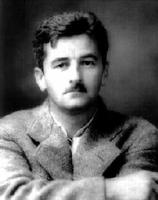威廉福克纳 诺贝尔奖获奖感言
Life
William Cuthbert Faulkner (1897-1962) was born on September 25 in New Albany, Mississippi and raised in nearby Oxford where he spent most of his life. His family came from the old, white upper class. Though in decline in the 20th century, the family retained some of the old customs and it was from his own family history, the southern region's characteristic of white social status, racial violence, honor codes, and traditional moral values that Faulkner drew the material for most of his fiction.
Faulkner dropped out of high school in 1915. Although he joined the British Royal flying Corps in Canada in 1918, the war ended when he had just finished his basic training in Toronto. Then he attended the University of Mississippi as a special student from 1919 to 1920, with high marks in French and Spanish but a failure in English. Then he held odd jobs in New York and Oxford for brief periods. With his friend Phil Stone's money he published The Marble Faun, a book of poems, in 1924. Since then his primary occupation was writing fiction.
In 1925 he went to New Orleans where some of his early poems, articles, and sketches were published, and where he came into contact with the new intellectual current of his day, notably Freud's psychology and James Joyce's vanguard fiction. It was in New Orleans, too, that he met Sherwood Anderson who influenced and encouraged him to pursue literary career.
威廉·卡斯伯特·福克纳(William Cuthbert Faulkner,1897年9月25日-1962年7月6日)是美国密西西比州的小说家20世纪最有影响力的作家之一,他是1949年诺贝尔文学奖获得者。他以长篇和中短篇小说见长,然而他同时也是一名出版诗人和编剧家。
大多数福克纳的作品背景被设定为他的故乡密西西比河畔,同时他也被认为最重要的南部作家之一。与马克吐温、罗伯特·潘·沃伦、弗兰纳里·奥康纳,杜鲁门·卡波,尤多拉·韦尔蒂,田纳西·威廉斯齐名。在他获得诺贝尔奖之前,他几乎无人所知尽管他的作品频频在十九世纪二十年代中期被发表。他现在被认为是美国最重要的作家之一。
他最著名的作品有:《声音与愤怒(喧哗与骚动)》(1929年)、《我弥留之际》(1930年)、《八月之光》(1932年)、《不败者》(1938年)、《押沙龙,押沙龙!》(1936年)。他还是多产的短篇小说家:他第一部短篇小说集《这十三篇》(1932年)收录了他最受文学界赞誉的(也是频频被各种文集选录的)短篇小说,包括《献给爱米丽的玫瑰》、《红叶》、《夕阳》和《干燥的九月》。 1930年代中,为了赚钱他出版了低俗小说类型的《圣殿》(Sanctuary)。其中邪恶、堕落腐败的主题(伴随浓厚的南方哥特风格)在今日仍然影响着通俗文学。此书续作《修女安魂曲》是他唯一出版的戏剧;引言就是整个一句话,复杂绵延的结构一直拖了几页才结束。他凭《寓言》获得过普利策奖;凭《故事选集》死后获得国家图书奖。1949年作品《我弥留之际》获诺贝尔文学奖。获奖理由: “因为他对当代美国小说做出了强有力的和艺术上无与伦比的贡献”。 他在获奖后的演说中,阐明了自己对于写作目的的看法,写出了作家应当创作出未曾有过的事物。短小精悍的一篇演说词包含了深刻的意义。他在斯德哥尔摩发表的得奖感言是诺贝尔文学奖最精彩的感言之一。他说道:“我拒绝认为人类已经走到了尽头……人类能够忍受艰难困苦,也终将会获胜。”这席发言和他的性格十分吻合。他捐献了自己获得的奖金,要“成立一个基金以支持鼓励文学新人”,最后建立了国际笔会/福克纳小说奖。
福克纳从1957年起担任弗吉尼亚大学的驻校作家,直到1962年去世。
Nobel Prize Acceptance Speech / William Faulkner
I feel that this award was not made to me as a man, but to my work -- a life's work in the agony and sweat of the human spirit, not for glory and least of all for profit, but to create out of the materials of the human spirit something which did not exist before. So this award is only mine in trust. It will not be difficult to find a dedication for the money part of it commensurate with the purpose and significance of its origin. But I would like to do the same with the acclaim too, by using this moment as a pinnacle from which I might be listened to by the young men and women already dedicated to the same anguish and travail, among whom is already that one who will some day stand here where I am standing.
Our tragedy today is a general and universal physical fear so long sustained by now that we can even bear it. There are no longer problems of the spirit. There is only the question: When will I be blown up? Because of this, the young man or woman writing today has forgotten the problems of the human heart in conflict with itself which alone can make good writing because only that is worth writing about, worth the agony and the sweat.
He must learn them again. He must teach himself that the basest of all things is to be afraid; and, teaching himself that, forget it forever, leaving no room in his workshop for anything but the old verities and truths of the heart, the old universal truths lacking which any story is ephemeral and doomed -- love and honor and pity and pride and compassion and sacrifice. Until he does so, he labors under a curse. He writes not of love but of lust, of defeats in which nobody loses anything of value, of victories without hope and, worst of all, without pity or compassion. His griefs grieve on no universal bones, leaving no scars. He writes not of the heart but of the glands.
Until he relearns these things, he will write as though he stood among and watched the end of man. I decline to accept the end of man. It is easy enough to say that man is immortal simply because he will endure: that when the last ding-dong of doom has clanged and faded from the last worthless rock hanging tideless in the last red and dying evening, that even then there will still be one more sound: that of his puny inexhaustible voice, still talking. I refuse to accept this. I believe that man will not merely endure: he will prevail. He is immortal, not because he alone among creatures has an inexhaustible voice, but because he has a soul, a spirit capable of compassion and sacrifice and endurance.
The poet's, the writer's, duty is to write about these things. It is his privilege to help man endure by lifting his heart, by reminding him of the courage and honor and hope and pride and compassion and pity and sacrifice which have been the glory of his past. The poet's voice need not merely be the record of man, it can be one of the props, the pillars to help him endure and prevail.
福克纳的诺贝尔文学奖颁奖仪式上的致辞
我感到这份奖赏不是授予我个人而是授予我的工作的, ——授予我一生从事关于人类精神的呕心沥血的工作。我 从事这项工作,不是为名,更不是为利,而是为了从人的 精神原料中创造出一些从前不曾有过的东西。因此,这份 奖金只不过是托我保管而已。作出符合这份奖赏的原意与 目的,与其奖金部分有相等价值的献词并不难,但我还愿 意利用这个时刻,利用这个举世瞩目的讲坛,向那些可能 听到我说话并已献身于同一艰苦劳动的男、女青年致敬。 他们中肯定有人有一天也会站到我现在站着的地方来的。 我们今天的悲剧是人们普遍存在一种生理上的恐惧, 这种恐惧存在已久,以致我们已经习惯了。现在不存在 精神上的问题,唯一的问题是:我什么时候会被炸得粉身碎骨?正因入此,今天从事写作的男、女青年已经忘 记了人类内心的冲突。然而,只有接触到这种内心冲突 才能产生出好作品,因为这是唯一值得写、值得呕心沥 血地去写地题材。 他一定要重新认识这些问题。他必须使自己明白世间 最可鄙的事情莫过于恐惧。他必须使自己永远忘却恐惧, 在他的工作室里除了心底古老的真理之外,不允许任何 别的东西有容身之地。没有这古老的普遍真理,任何小 说都只能昙花一现,不会成功;这些真理就是爱情、荣誉、怜悯、自尊、同情与牺牲等感情。若是他做不到这 样,他的气力终归白费。他不是写爱情而是写情欲,他写的失败是没有人失去可贵东西的失败,他写的胜利是 没有希望、更糟地是,甚至没有怜悯或同情的胜利。他不是为遍地白骨而悲伤,所以留不下深刻的痕迹。他不 是在写心灵而是在写器官。 在他重新懂得这些之前,他写作时,就犹如站在处于世界末日的人类中去观察末日的来临。我不接受人类 末日的说法。因人能传种接代而说人是不朽的,这很容易。说即使最后一次钟声已经消失,消失在再也没有潮 水冲刷的映在落日余晖里的海上的最后一块无用礁石旁时,还会有一个声音,人类微弱的、不断的说话声,这也很容易。但是我不能接受这种说法。我相信人类不仅 能传种接代,而且能战胜一切而永存。人之不朽不是因 为在动物中惟独他永远能发言,而是因为他有灵魂,有同情心、有牺牲和忍耐精神。诗人和作家的责任就是把 这些写出来。诗人和作家的特殊光荣就是去鼓舞人的斗 志,使人记住过去曾经有过的光荣——人类曾有过的勇气、荣誉、希望、自尊、同情、怜悯与牺牲精神——已达到不朽。诗人的声音不应只是人类的记录,而应是使人类永存并得到胜利的支柱和栋梁。
附件列表
词条内容仅供参考,如果您需要解决具体问题
(尤其在法律、医学等领域),建议您咨询相关领域专业人士。
如果您认为本词条还有待完善,请 编辑
上一篇 马丁路德金 Time to Break Silence 下一篇 形容词及其用法

